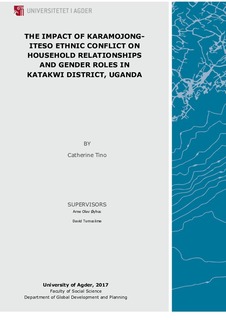| dc.contributor.author | Tino, Catherine | |
| dc.date.accessioned | 2018-04-09T09:56:16Z | |
| dc.date.available | 2018-04-09T09:56:16Z | |
| dc.date.issued | 2017 | |
| dc.identifier.uri | http://hdl.handle.net/11250/2493190 | |
| dc.description | Master's thesis Development management UT503 - University of Agder 2017 | nb_NO |
| dc.description.abstract | This study analyzed the direct and indirect impacts of the ethnic conflict between the Karamojong and Iteso ethnic groups in North Eastern Uganda on household livelihoods and the ways in which households respond to and cope with the effects of conflicts through changes in gender roles and relations. A qualitative approach including personal interviews and focus group discussions was employed. The main target group was elderly women and men who have experience from the pre-conflict to the post-conflict period to understand what the gender roles were before, how they changed during the conflict also if the changes are still evident today. The other target group was the youth born during the conflict to understand their gender roles during the conflict and if they still play the same roles today. Officers of the local government and Non-Governmental Organizations involved in gender related issues in the sub-county were also interviewed to find out what they had done in promoting the new gender roles in households.
The study found out that many of the community members who had adopted new gender roles during the conflict period, especially the male, changed to their original ones. This created an impression that little was done to help these people uphold those new roles. It is recommended that all involved partners team up to play a practical complementary role of creating awareness, educating people about the benefits of the new roles they had adopted as well as forging out ways to bring about development. A partnership participatory framework is also proposed basing on what the respondents had submitted as suggestions. It is hoped this can promote and improve household gender relationships across generations hence development. | nb_NO |
| dc.language.iso | eng | nb_NO |
| dc.publisher | Universitetet i Agder ; University of Agder | nb_NO |
| dc.rights | Attribution-NonCommercial-NoDerivatives 4.0 Internasjonal | * |
| dc.rights.uri | http://creativecommons.org/licenses/by-nc-nd/4.0/deed.no | * |
| dc.subject | UT503 | nb_NO |
| dc.title | THE IMPACT OF KARAMOJONG – ITESO ETHNIC CONFLICT ON HOUSEHOLD RELATIONSHIPS AND GENDER ROLES IN KATAKWI DISTRICT, UGANDA | nb_NO |
| dc.type | Master thesis | nb_NO |
| dc.subject.nsi | VDP::Samfunnsvitenskap: 200::Samfunnsgeografi: 290 | nb_NO |
| dc.subject.nsi | VDP::Samfunnsvitenskap: 200::Sosiologi: 220 | nb_NO |
| dc.source.pagenumber | 87 p. | nb_NO |

